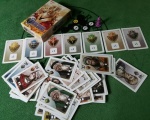7 Kingdoms

Autoren:
Illustratoren:
Genres:
Spielmechaniken:
Release:
2014
Anzahl der Spieler:
2 bis 4 Spieler
Spielzeit:
20 Minuten
Altersfreigabe:
Frei ab 10 Jahre
In 7 Kingdoms, players are royal agents who want to collect as many followers as possible. Whoever does this best will win the game.
The deck in 7 Kingdoms consists of 49 cards in seven types, with each type having seven cards in a particular number range: king (1-7), bishop (8-14), etc. up to peasant (43-49). Each number range has seven cards in it, with each being a different color and bearing a crest of that color. Each player starts with three cards in hand, and one crest card of each type is laid in a row, with one card placed face up next to each crest.
Each round, players take turn laying one card face up in front of them, then they resolve the cards from high to low. Whoever played the highest card places it on the opposite side of the leftmost crest card, then takes 1-4 cards from those on display next to the crests as determined by the power of the card played. Then the player with the next highest card goes, etc. Any cards unclaimed are placed to the right of played cards, then the row is filled with cards from the deck until seven cards are on display once again.
With each card claimed, the player can either add it to his hand (up to a maximum of three cards in hand) or place it in his scoring pile. Kings, for example, let you take any four cards on display, while generals let you take cards from three consecutive spaces, princesses let you take any two cards, and peasants let you take one of two cards from specific spaces. Thus, the low cards let you claim first, but put more restrictions on what you claim or have you claim fewer cards. The bishop scores himself, then let you place one of two bonus tokens on the leftmost crest card, reveal another bonus token, then claim one card.
When the deck runs out or each crest card has a bonus token, the game ends and players score any cards remaining in hand. Each card claimed is worth 1 point (except for kings, which are worth 2), and whoever has the most cards of a crest claims the bonus token on that crest, thereby earning bonus points or doubling his score.

